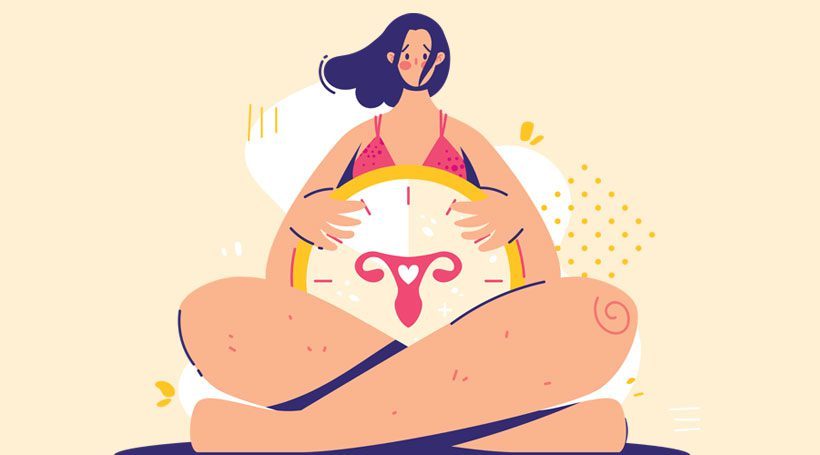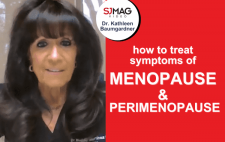When we think of menopause, hot flashes and night sweats often steal the spotlight. But for many women, the hormonal changes of midlife bring on a host of unexpected – and often unsettling – symptoms. Heart palpitations, hair thinning, body odor changes, dizziness, urinary incontinence and anxiety are just some of the issues women may experience during perimenopause and menopause.
Understanding why these symptoms happen can make them less alarming, and there are ways to manage them.

Wendy Martinez, MD
Anxiety and Mood Swings: Not Just in Your Head
For some women, menopause arrives with an emotional rollercoaster they didn’t see coming.
“A lot of times, people come in on three or four different antidepressants, and when you start talking with them, you realize no one ever checked their hormone levels,” says Wendy Martinez, MD, a menopause specialist and founder of Advocare The Women’s Group for OB/GYN.
Fluctuating estrogen can trigger anxiety, irritability and even panic attacks, especially for women who have never experienced them before. But for those who have battled postpartum depression or anxiety in earlier life stages, menopause can hit even harder.
“People who have had postpartum depression or really bad PMS are more likely to get hit with this again during perimenopause,” Martinez explains. “I always ask patients, ‘Did you have depression or anxiety before?’ Some have, and at this point, it’s getting worse. Others never did, and now they’re suddenly experiencing it for the first time.”
She notes that many women experiencing these mood changes don’t actually need psychiatric medication but instead need a closer look at their hormone levels. “Had their estrogen, progesterone and testosterone levels been checked, they may not have been put on all these medications,” she says. For some, hormone replacement therapy (HRT) can help balance out these fluctuations.
Beyond medication, Martinez emphasizes lifestyle changes, especially exercise. “Even just brisk walking for 30 minutes, five days a week, can raise endorphins and significantly help with anxiety, depression and mood swings,” she says.

Owen Montgomery, MD
Heart Palpitations: A Menopausal Surprise
A racing heart can be one of the most distressing menopause symptoms. Many women describe feeling as if their heart is fluttering, skipping beats or pounding out of their chest – only to be told their heart is perfectly healthy.
“We know that estrogen has a role in regulating blood vessels and the autonomic nervous system,” says Owen Montgomery, MD, a gynecologist and physician vice president at Jefferson Health East Region. “When estrogen drops, women can experience palpitations, sometimes alongside hot flashes.”
Because palpitations can also be linked to thyroid issues, another condition that becomes more common in midlife, doctors often check thyroid function as well. And while occasional palpitations are normal, Montgomery advises paying attention to patterns. “If they’re happening frequently, especially with chest pain or dizziness,” he says, “that’s a reason to get checked out.”
Hair and Skin Changes: The Slow Fade
Aging may be part of the reason hair gets thinner and skin gets drier, but menopause accelerates the process.
“Estrogen elongates the hair growth cycle, keeping it in its active phase longer,” Montgomery explains. “When estrogen drops, hair follicles become more fragile, and testosterone can become more dominant, leading to thinning and even hair loss.” Some women also experience acne flare-ups due to the shift in hormone balance.
A simple yet effective solution? Scalp massage. “Massage your scalp to stimulate blood flow to the hair follicles. It can make a difference,” Martinez says. “We now have scalp massagers that help, but even using your fingers works.”
Skin also becomes thinner and drier as collagen and elastin levels decline. Martinez often sees women who are surprised by how much their skin has changed. “You might notice fine lines, increased sensitivity or a crepey texture,” she says. “Keeping up with hydration and using products with hyaluronic acid and retinol can help, but estrogen therapy, whether systemic or topical, can also improve skin quality.”
Urinary Incontinence: The Unspoken Symptom
Walk into any drugstore, and you’ll find aisles of incontinence pads, a $2 billion industry. Yet many women don’t realize bladder leaks are linked to menopause until they start experiencing them.
“About 50% of women have some degree of urinary incontinence, but only 15% ever get treatment,” says Montgomery. The loss of estrogen weakens pelvic floor muscles, making it harder to control urine flow. “This is a huge quality-of-life issue, but the right approach can make a difference.”
Pelvic floor exercises, called Kegels, are a first line of defense. “Squeeze before you sneeze,” Montgomery tells his patients. “Doing Kegels daily can help prevent leakage before it starts.” He also encourages Pilates and yoga, which naturally strengthen the core and pelvic floor.
For women with significant bladder issues, vaginal estrogen therapy can restore some of the lost elasticity in the bladder and urethra. “It’s a game changer for many of my patients,” Montgomery says.
Menopause Isn’t the End. It’s a New Chapter.
For many women, the hardest part of menopause isn’t just the symptoms. It’s figuring out what’s happening to their bodies.
“I see patients all the time who think their anxiety, dizziness or palpitations are totally unrelated to menopause,” says Montgomery. “But once we connect the dots, we can actually do something about it.”
That process can take some trial and error. There’s no universal fix for menopause, but for women struggling with symptoms, finding the right treatment, whether it’s hormone therapy, lifestyle changes or targeted medications, can make a major difference.
Martinez emphasizes that hormone therapy is not one-size-fits-all. “I don’t just go by blood tests,” she says. “I listen to what my patients tell me, how they’re feeling, and I check for physical signs, like vaginal and skin changes. Sometimes, the first treatment we try isn’t quite right, so we adjust.”
Montgomery agrees that individualized care is key. “Some women do great on hormone therapy, while others might need a different strategy, like non-hormonal medications or pelvic floor therapy,” he says. “The key is knowing that menopause care isn’t a one-and-done prescription. It’s a process.”
“Women today are living longer and healthier lives than ever before,” says Montgomery. “The second 50 years can be the best years, but only if you take menopause seriously and get the right care.”
















